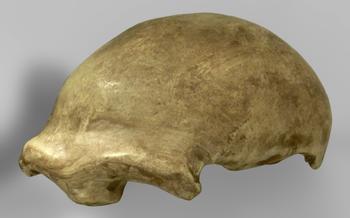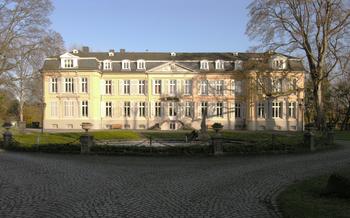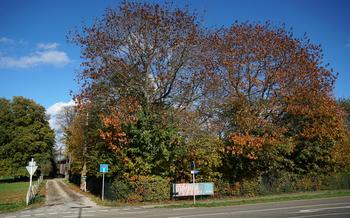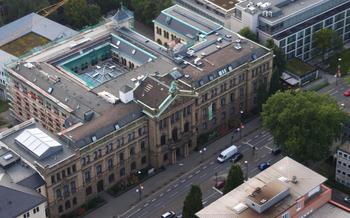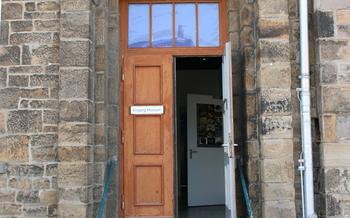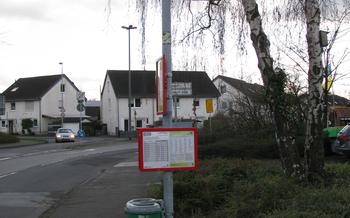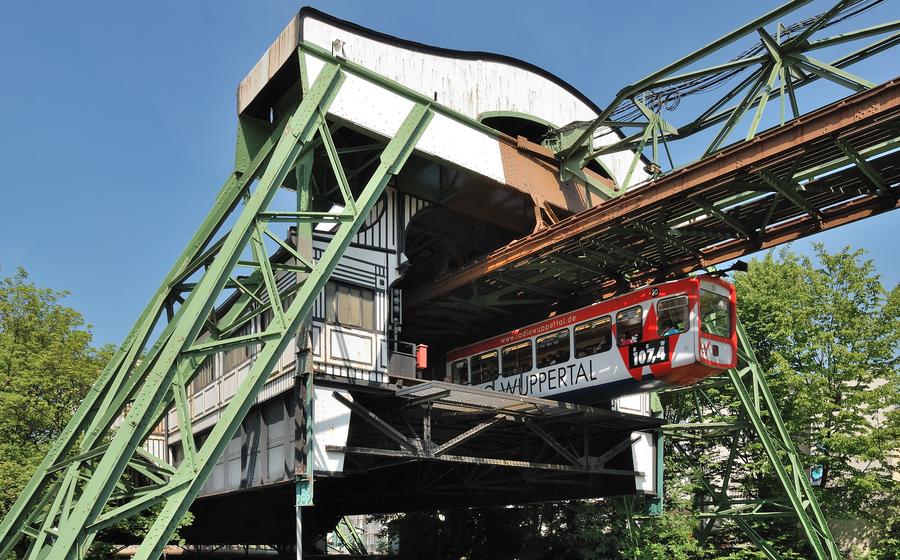
Neanderthal Museum (in nearby Mettmann)
- Neanderthal Museum: A Journey into Human Origins
- Exploring the Neanderthal Valley
- Neanderthal Man Exhibition
- Hands-On Activities for Families
- Multidisciplinary Approach
- Guided Tours and Audio Guides: Enhancing Your Neanderthal Experience
- Exhibitions on Human Evolution
- Research Center and Collaborations: Unlocking the Secrets of Human Origins
- Special Events and Workshops
- Museum Shop and Café: Unique Souvenirs and Refreshments
- Accessibility and Facilities
- Nearby Attractions and Activities
- Photography and Social Media: Share Your Neanderthal Experience
- Educational Resources and Materials:
Neanderthal Museum: A Journey into Human Origins
The Neanderthal Museum in Mettmann, Germany, is a captivating exploration into the origins of humankind. Housed in a striking modern building, the museum showcases the fascinating story of our ancestors, the Neanderthals, who once roamed the earth. Step into a realm where history, science, and discovery converge, as you delve into the lives of these enigmatic beings.
This world-renowned institution is strategically located in the heart of the Neanderthal Valley, where the first Neanderthal fossils were unearthed in 185Immerse yourself in a journey through time as you wander through interactive exhibits, marvel at life-size replicas, and uncover the secrets of our evolutionary past.
The Neanderthal Museum is more than just a repository of ancient artifacts; it's a vibrant center of learning and innovation. Engage in hands-on activities, participate in educational workshops, and embark on guided tours to gain a deeper understanding of human evolution. Discover the tools they crafted, the challenges they faced, and the remarkable legacy they left behind.
Prepare to be captivated by the Neanderthal Museum, an extraordinary testament to our shared heritage.
Exploring the Neanderthal Valley
Beyond the museum's walls, the Neanderthal Valley beckons with its natural beauty and rich history. Lace up your hiking boots and embark on scenic trails that wind through the valley, offering breathtaking views of the surrounding landscape. Discover the tranquil Neanderthal Gorge, a nature preserve teeming with diverse flora and fauna. Along the way, keep an eye out for fossil discoveries and archaeological sites, reminders of the valley's ancient inhabitants.
Join a guided tour to delve deeper into the valley's secrets. Knowledgeable guides will lead you to hidden gems, such as the Feldhofer Grotto, where Neanderthal remains and tools were unearthed. Alternatively, explore at your own pace, following self-guided trails that provide informative signage and insights into the valley's geological and cultural significance.
Neanderthal Man Exhibition
The Neanderthal Man Exhibition is the heart of the Neanderthal Museum, showcasing life-size replicas and dioramas that bring the extinct hominins back to life. These detailed recreations depict Neanderthals engaged in various activities, from hunting and gathering to crafting tools and raising families. Through these immersive displays, visitors gain a deeper understanding of the Neanderthal lifestyle, their social structures, and their relationship with the environment.
Artifacts and tools used by Neanderthals are also on display, providing tangible evidence of their ingenuity and adaptability. These include stone tools, bone implements, and jewelry, offering insights into their technological advancements and artistic expressions. The exhibition also explores the hunting and gathering strategies of Neanderthals, highlighting their reliance on large game such as mammoths and woolly rhinoceroses, as well as their ability to adapt to changing environmental conditions.
A comparative section of the exhibition delves into the differences and similarities between Neanderthals and modern humans. Visitors can examine skeletal remains, compare facial features, and learn about the genetic relationships between the two species. This comparative approach helps shed light on the evolutionary journey of our ancestors and the factors that led to the eventual dominance of Homo sapiens.
Hands-On Activities for Families
The Neanderthal Museum offers a range of interactive exhibits and hands-on activities designed to engage and educate families with children. Young visitors can participate in fossil casting workshops, where they can create their own replicas of ancient fossils using plaster and molds. Stone tool making workshops provide a unique opportunity to learn about the tools and techniques used by Neanderthals, and to create their own stone tools to take home.
In addition to these workshops, the museum features educational games and puzzles that teach children about Neanderthal life and culture. Family-friendly events and programs are regularly organized, such as themed weekends, storytelling sessions, and science shows. These events provide a fun and engaging way for families to learn about Neanderthals and human evolution.
The museum's interactive exhibits are designed to capture the imagination of children and spark their curiosity about the past. From touchscreens and interactive displays to life-size replicas and dioramas, the exhibits provide a multi-sensory experience that brings the world of Neanderthals to life.
The Neanderthal Museum is committed to providing an educational and enjoyable experience for families with children. Through its interactive exhibits, hands-on workshops, and family-friendly events, the museum offers a unique opportunity for families to learn about human evolution and the fascinating world of Neanderthals.
Multidisciplinary Approach
The Neanderthal Museum stands out for its multidisciplinary approach to understanding human evolution. It collaborates closely with scientists, researchers, and experts from various fields, including archaeology, paleontology, and genetics. This collaborative effort allows the museum to present a comprehensive and up-to-date understanding of Neanderthals and their place in human history.
The museum houses on-site research facilities, where scientists conduct studies and analyze artifacts. These ongoing research projects contribute to our knowledge of Neanderthal behavior, biology, and cultural practices. The museum also collaborates with universities and institutions worldwide, facilitating the exchange of ideas and expertise.
Through this multidisciplinary approach, the Neanderthal Museum plays a vital role in advancing the field of paleoanthropology. Its research and discoveries contribute to our understanding of human evolution and the relationship between different hominin species. The museum serves as a hub for international collaboration and research, fostering a deeper understanding of our shared human heritage.
Guided Tours and Audio Guides: Enhancing Your Neanderthal Experience
Immerse yourself in the fascinating world of Neanderthals with guided tours and audio guides at the Neanderthal Museum.
Knowledgeable guides, fluent in various languages, lead visitors through the exhibits, providing in-depth insights into the lives, culture, and environment of our ancient ancestors. Their expertise brings the museum's collection to life, offering a deeper understanding of Neanderthal history and evolution.
For those who prefer self-guided exploration, multilingual audio guides are available. These guides offer a personalized tour experience, allowing visitors to set their own pace and focus on specific areas of interest.
Advance booking is recommended to secure your spot on a guided tour, especially during peak seasons or for larger groups. Group discounts are available, making it an affordable option for families, schools, or organizations.
Tailored tours are also offered, catering to specific interests or themes. Whether you're passionate about archaeology, paleontology, or human evolution, these specialized tours provide an immersive and educational experience.
Exhibitions on Human Evolution
The Neanderthal Museum also features captivating exhibitions that delve into the captivating journey of human evolution. Interactive displays showcase the fascinating world of primates, illustrating the diversity and complexity of our ancestors. Visitors can embark on a comparative exploration of different hominin species, gaining insights into their unique characteristics and adaptations. A comprehensive timeline guides visitors through major evolutionary events, shedding light on the profound transformations that have shaped our lineage. The relationship between humans and Neanderthals is explored in depth, highlighting their shared ancestry and the intriguing aspects that set them apart. These exhibitions provide a comprehensive overview of human evolution, offering a deeper understanding of our origins and the interconnectedness of all life on Earth.
Research Center and Collaborations: Unlocking the Secrets of Human Origins
The Neanderthal Museum is not merely an exhibition space; it houses a dynamic research center that contributes to the field of paleoanthropology. In collaboration with universities and institutions worldwide, the museum engages in ongoing research projects and discoveries. These collaborations facilitate international partnerships and the exchange of knowledge, fostering a vibrant scientific community.
The on-site research facilities provide scientists with state-of-the-art equipment and resources to study Neanderthal remains, artifacts, and the surrounding environment. These studies delve into various aspects of Neanderthal life, including their diet, hunting strategies, social structure, and genetic makeup.
The museum's commitment to research extends beyond its walls. Through educational programs, workshops, and public lectures, the Neanderthal Museum shares its findings with the wider community, fostering a deeper understanding of our human origins and the significance of the Neanderthal lineage.
Special Events and Workshops
The Neanderthal Museum offers a dynamic calendar of special events and workshops that delve deeper into the fascinating world of Neanderthals and human evolution. These events provide unique opportunities for visitors to engage with experts, participate in hands-on activities, and gain new perspectives on our shared history.
Temporary exhibitions showcase the latest findings and research related to Neanderthals and their contemporaries. These exhibitions often feature interactive displays, multimedia presentations, and artifacts not typically on display. Themed events and workshops explore specific aspects of Neanderthal life, such as their hunting and gathering strategies, their social structure, or their artistic expressions.
Lectures and presentations by renowned experts offer in-depth insights into the latest discoveries and theories in the field of paleoanthropology. These events provide a platform for public engagement, where visitors can ask questions, share their thoughts, and engage in lively discussions with the experts.
Hands-on workshops provide a unique opportunity for visitors, especially families and children, to engage with the material culture of Neanderthals. Fossil casting and stone tool making workshops allow participants to experience firsthand the techniques and skills used by our ancestors. Educational games and puzzles challenge visitors to test their knowledge and learn in a fun and interactive way.
Special events and workshops at the Neanderthal Museum offer a dynamic and engaging way to explore the fascinating world of Neanderthals and human evolution. These events provide opportunities for visitors to learn from experts, participate in hands-on activities, and gain a deeper understanding of our shared past.
Museum Shop and Café: Unique Souvenirs and Refreshments
The Neanderthal Museum offers a well-stocked museum shop where you can find a wide range of souvenirs, educational materials, and unique gifts inspired by Neanderthals. From books and DVDs to replicas of Neanderthal tools and jewelry, there's something for everyone. The shop also features a selection of children's toys and games, making it a great place to pick up a special memento for your little ones.
After exploring the museum, you can relax and refuel at the on-site café. Enjoy a variety of refreshments and snacks, including sandwiches, salads, and pastries, while taking in the stunning views of the Neanderthal Valley. The café provides a cozy and welcoming atmosphere, making it the perfect place to unwind and reflect on your visit.
Accessibility and Facilities
The Neanderthal Museum is committed to providing an accessible and welcoming environment for all visitors. Wheelchair users and individuals with limited mobility can easily navigate the museum's exhibits and facilities thanks to ramps and elevators throughout the building. Family-friendly amenities such as strollers and baby changing rooms are available, ensuring a comfortable visit for families with young children. Lockers and storage facilities are provided for visitors to safely store their belongings while they explore the museum. Ample parking space is available on-site, making it convenient for visitors to arrive by car.
Nearby Attractions and Activities
The Neanderthal Museum is situated in the heart of the picturesque Neanderthal Valley, offering a wealth of nearby attractions and activities. Explore the charming town of Mettmann, just a short walk away, with its historic churches, quaint cafes, and vibrant shopping streets. Wuppertal, known for its unique suspension railway, is a must-visit for its art, culture, and stunning views.
Venture further to discover other hidden gems in the region. Visit Schloss Burg, a magnificent castle nestled amidst lush greenery, or explore the Altenberg Cathedral, a masterpiece of Gothic architecture. Immerse yourself in the region's industrial heritage at the LVR-Industriemuseum Textilfabrik Cromford, a former textile factory transformed into a museum.
Outdoor enthusiasts can indulge in hiking, biking, and swimming in the scenic Neanderthal Valley. The Neanderlandsteig hiking trail promises breathtaking views, while the Neanderthal Radweg cycling route offers a leisurely ride through the valley. Take a refreshing dip in the Neanderbad swimming pool or enjoy a leisurely stroll along the banks of the Düssel River.
Plan your visit to coincide with local festivals and events, such as the Neanderthal Festival, which celebrates the region's rich history and culture. Savor the flavors of regional cuisine at traditional German restaurants or indulge in international delights at trendy cafes. Whether you're seeking history, nature, or culinary experiences, the Neanderthal Valley and its surroundings offer something for every traveler.
Photography and Social Media: Share Your Neanderthal Experience
The Neanderthal Museum encourages visitors to capture their experiences through photography and share them on social media. Official hashtags and social media channels provide a platform for engagement and storytelling. Visitors are encouraged to share their photos, videos, and insights, using these platforms to connect with fellow enthusiasts and contribute to the global conversation about Neanderthals. By sharing their experiences, visitors become part of a vibrant community, fostering a sense of shared wonder and exploration.
Respectful conduct and responsible photography are emphasized to ensure a positive and inclusive environment for all visitors. Guidelines are provided to encourage ethical and mindful behavior while capturing images within the museum. By following these guidelines, visitors can contribute to the preservation of the museum's artifacts and the overall visitor experience.
Educational Resources and Materials:
The Neanderthal Museum is committed to sharing knowledge and fostering a deeper understanding of human evolution. To this end, it offers a wealth of educational resources and materials for visitors of all ages. Online resources, including virtual tours and educational materials, allow for continued exploration and learning beyond the museum walls. Lesson plans and teaching materials are available for educators to incorporate Neanderthal studies into their curriculum. Additionally, the museum publishes research papers, books, and other publications that contribute to academic research and public understanding of human evolution. These resources provide a platform for disseminating the latest findings and Erkenntnisse gained through ongoing research at the museum.
